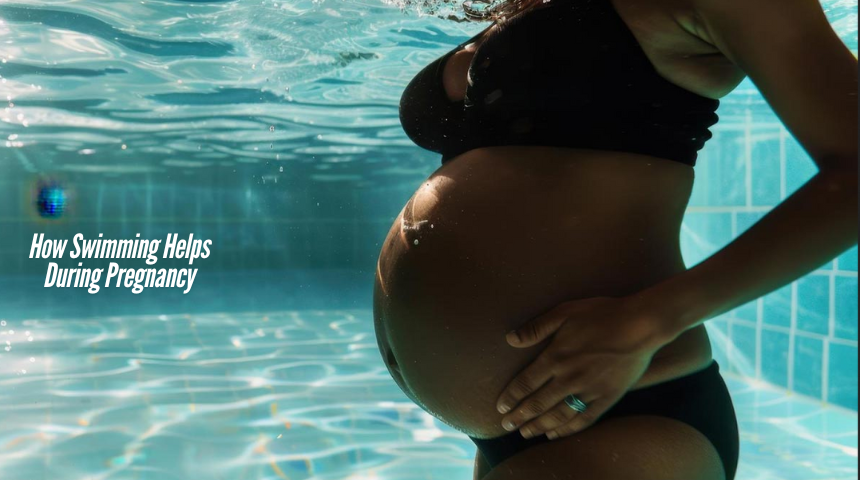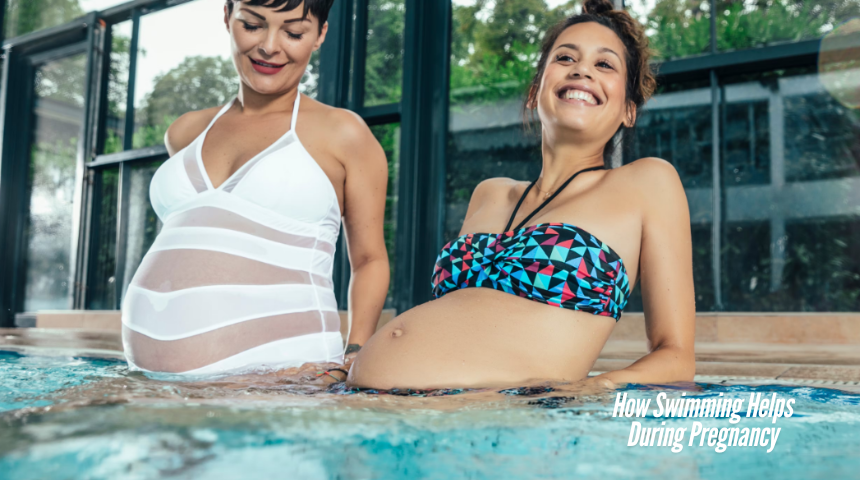Pregnancy is an exciting journey, but it often comes with a long list of “dos and don’ts.” Finding activities that are both safe and enjoyable can be a challenge.
Fortunately, swimming is a wonderful way to stay active and healthy during pregnancy. In this blog, I’ll explore the many benefits of swimming and the safety practices to ensure a positive experience for you and your baby.
How Swimming Helps During Pregnancy?
Swimming during pregnancy offers many benefits. You find it gentle on the body while providing effective exercise. It eases pressure, reducing joint pain and swelling. The water’s buoyancy supports the extra weight and helps you feel lighter.
Swimming boosts circulation, which improves oxygen flow to the baby. It builds strength and prepares the body for labor. You also notice better sleep after swimming sessions. The cool water soothes pregnancy-related aches and discomfort.
Safety practices are important. You avoid overheating and stay hydrated. Please consult a doctor before swimming to ensure it’s safe for you. Knowing your limits helps you stay comfortable and avoid overexertion.
Why Swimming Is Great During Pregnancy
Low Impact: Swimming is gentle on your body. The buoyancy of water reduces strain on joints and supports your growing belly, making it an excellent low-impact exercise.
Unlike activities such as running or weightlifting, swimming minimizes the risk of injury by cushioning your movements. This makes it particularly beneficial for women experiencing joint pain or lower back discomfort.
Full-Body Workout: Swimming works multiple muscle groups simultaneously, helping you build strength, endurance, and aerobic capacity without overexertion.

Whether you’re doing breaststroke, backstroke, or simply treading water, you engage muscles in your arms, legs, and core. This comprehensive workout can help maintain your overall fitness and prepare your body for labor.
Improved Circulation: Moving in water enhances blood flow, reducing swelling in your feet and ankles—a common pregnancy complaint.
Better circulation also helps deliver oxygen and nutrients to your baby more efficiently, which is vital for their development.
Mental Relaxation: The soothing sensation of water can help reduce stress, improve your mood, and offer a welcome escape from daily pressures.
Being in the water provides a sense of weightlessness that can be incredibly calming, especially during the later stages of pregnancy when your body feels heavier.
Health Benefits Of Swimming While Pregnant
Relief from Pregnancy Discomfort: Water alleviates common aches and pains, such as backaches, pelvic pressure, and swelling. It’s like a mini massage for your entire body!
The resistance of water also helps stretch and relax muscles, which can ease stiffness and promote flexibility.
Better Sleep: Struggling to sleep? Swimming can help tire your body in a good way, improving your ability to rest at night.

Regular physical activity, like swimming, reduces stress and anxiety, which are often culprits of pregnancy-related insomnia. The relaxing nature of water adds another layer of comfort to help you unwind.
Fitness Maintenance: Swimming keeps you fit, builds stamina, and prepares your body for labor and postpartum recovery. It’s a safe way to maintain your strength and endurance without placing undue stress on your body.
Staying active during pregnancy can also help with managing weight gain and reducing the risk of gestational diabetes.
Possible Benefits for Baby: Emerging studies suggest that swimming may positively impact fetal development, including potential benefits for the baby’s neurological system.
While more research is needed, initial findings are promising, indicating that swimming during pregnancy could support healthy brain development in your child.
Safety Considerations For Swimming During Pregnancy
Doctor’s Approval First: Always consult your healthcare provider before starting or continuing any exercise routine, especially if you have complications or medical conditions.
Your doctor can help assess whether swimming is safe for your specific situation and recommend any modifications if needed.
Avoid High-Risk Activities: Steer clear of activities like diving, water skiing, or swimming in hot water environments, as they pose higher risks. These activities can increase the likelihood of injury or overheating, which could harm both you and your baby.
Know Your Limits: Listen to your body. Stop swimming if you feel nauseous, dizzy, overheated, or experience pain, vaginal bleeding, or other unusual symptoms.
Overexertion can lead to fatigue and dehydration, so it’s essential to pace yourself and take regular breaks.

Hydration and Sun Safety: Even if you’re surrounded by water, dehydration is still a risk. Drink plenty of water before, during, and after swimming.
If you’re outdoors, use a broad-spectrum sunscreen with SPF 30 or higher, wear a hat, and try to swim during cooler parts of the day to avoid overheating.
Choosing Safe Swimming Locations
Pools: Ensure the pool is clean and properly chlorinated. Studies suggest that swimming in a well-maintained pool poses no harm to pregnant individuals or their babies. Chlorine levels should be balanced to prevent irritation or infection.
Natural Water Bodies: Exercise caution when swimming in lakes, rivers, or oceans. Check for bacteria levels, avoid strong currents, and ensure the water temperature is comfortable. Always be aware of local advisories regarding water quality to avoid potential risks.
Avoid Hot Tubs: Hot water can raise your body temperature above safe levels, increasing risks such as birth abnormalities or miscarriages. Stick to pools or natural water bodies with moderate temperatures. If you’re looking to relax, opt for a warm (not hot) bath instead.
Tips For Enjoying Swimming During Pregnancy
Invest in a Comfortable Swimsuit: Choose a maternity-friendly swimsuit that accommodates your changing body. Look for options with adjustable straps and stretchy material to ensure a perfect fit.
Swim with a Buddy: Safety comes first! Always have someone nearby, especially if there’s no lifeguard. Swimming with a friend or family member can also make the experience more enjoyable.

Stick to Safe Strokes: Gentle strokes like the breaststroke or backstroke are ideal for pregnancy. These movements minimize strain on your abdomen while providing an effective workout.
Limit Session Duration: Keep swim sessions to about 30 minutes, 3 to 5 times a week, depending on your fitness level. Overdoing it can lead to fatigue, so moderation is key.
Stay Hydrated: Bring water to drink during breaks, even if you’re swimming indoors. Dehydration can occur more quickly than you might think, even when you’re surrounded by water.
Use Sunscreen: For outdoor swimming, apply SPF 30+ sunscreen and reapply frequently to protect your skin. Sunburns can be especially uncomfortable during pregnancy, so take precautions.
When To Stop Swimming
If you experience any of the following, it’s time to exit the water and consult your doctor:
1. Dizziness or lightheadedness.
2. Vaginal bleeding or unusual discharge.
3. Abdominal or pelvic pain.
4. Shortness of breath or fatigue.
Listening to your body and being mindful of any changes is essential to ensure a safe and enjoyable swimming experience.
FAQ
Why is swimming so good for pregnancy?
Swimming is gentle and low-impact, making it ideal during pregnancy. It reduces joint pain, and swelling, and supports the extra weight. The water soothes aches and boosts circulation, improving oxygen flow to the baby. It also helps build strength and endurance for labor.
How often should you swim when pregnant?
Swimming three to five times a week for 20 to 30 minutes is ideal. It provides regular exercise without overexertion. I always recommend listening to your body and taking breaks as needed.
What if a pregnant woman goes swimming?
Swimming during pregnancy is generally safe and beneficial. It eases discomfort, enhances sleep, and supports overall health
Is pool chlorine safe during pregnancy?
Yes, studies show that swimming in chlorinated pools is safe and may even lower the risk of preterm delivery or congenital issues. Properly maintained pools are designed to keep bacteria and other harmful substances at bay.
Can swimming help during all trimesters?
Absolutely! Swimming is generally safe in all three trimesters. It’s particularly helpful in the third trimester for relieving aches, improving mobility, and preparing your body for labor.
Are there specific strokes better suited for pregnancy?
Yes, gentle strokes like the breaststroke or backstroke are ideal as they avoid excessive twisting of the abdomen. Floating and light treading can also be effective for relaxation and fitness.
Conclusion
Swimming is a safe, effective, and enjoyable way to stay active during pregnancy. It provides relief from aches and pains, improves sleep, and offers significant health benefits for both you and your baby.
By following safety practices and consulting your doctor, you can make swimming a regular part of your pregnancy wellness routine. So grab your swimsuit, take the plunge, and enjoy the many perks of swimming while nurturing new life!